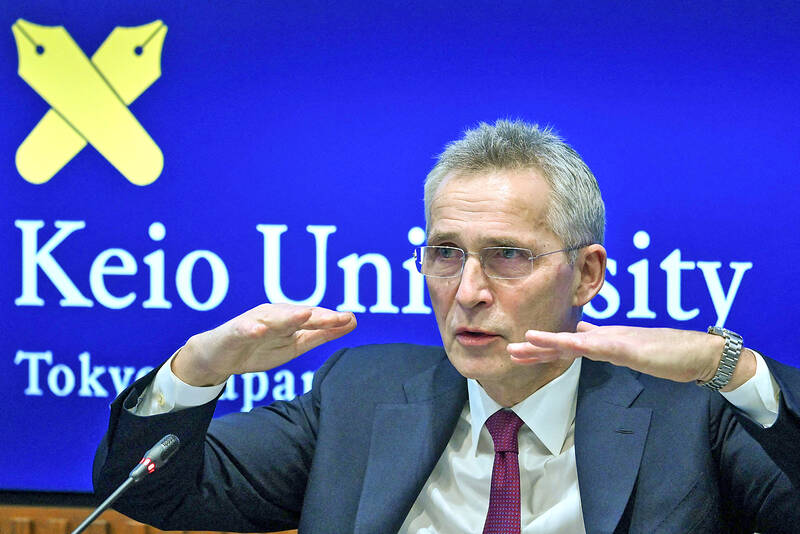China’s growing assertiveness and collaboration with Russia poses a threat not only to Asia, but also to Europe, NATO Secretary-General Jens Stoltenberg said yesterday as he sought stronger cooperation and more “friends” for NATO in the Indo-Pacific region.
Stoltenberg said that China is increasingly investing in nuclear weapons and long-range missiles without providing transparency or engaging in meaningful dialogue on arms control for atomic weapons, while escalating coercion of its neighbors and threats against Taiwan.
“The fact that Russia and China are coming closer and the significant investments by China and new advanced military capabilities just underlines that China poses a threat, poses a challenge also to NATO allies,” Stoltenberg told an audience at Keio University in Tokyo. “Security is not regional, but global.”

Photo: AFP
“NATO needs to make sure we have friends,” he said. “It is important to work more closely with our partners in the Indo-Pacific.”
China is increasingly working with Russia and they lead an “authoritarian pushback” against the rules-based, open and democratic international order, he said.
Stoltenberg said that NATO does not regard China as an adversary or seek confrontation, and that the alliance would continue to engage with China in areas of common interest.
Chinese Ministry of Foreign Affairs spokeswoman Mao Ning (毛寧) defended China as “a force for regional and global peace and stability,” and criticized NATO for labeling China a threat and for expanding its military ties to Asia.
“NATO has constantly sought to reach beyond its traditional defense zone and scope, strengthen military and security ties with Asia-Pacific countries and played up China’s threats,” Mao said. “I would like to stress that the Asia-Pacific is not a battlefield for the geopolitical contest and does not welcome the Cold War mentality and bloc confrontation.”
Stoltenberg and Japanese Prime Minister Fumio Kishida held talks on Tuesday and agreed to step up their partnership in security in cyberspace, space and other areas.
Besides Japan, NATO is also strengthening “practical cooperation” with Australia, New Zealand and South Korea in maritime cybersecurity and other areas, and stepping up participation of their leaders and ministers in NATO meetings, he said.
Kishida on Tuesday announced Japan’s plans to open a representative office at NATO.
Stoltenberg on Wednesday said that Europe could not ignore what happens in East Asia because global security is interconnected.
“Working with partners around the world, especially in the Indo-Pacific, is part of the answer to a more dangerous and unpredictable world,” he said.
“The war in Ukraine demonstrates how security is interconnected. It demonstrates that what happens in Europe has a consequence for East Asia, and what happens in East Asia matters to Europe,” he said, adding that “the idea China doesn’t matter for NATO doesn’t work.”
Although he said China was not an adversary, the country was becoming a “more and more authoritarian power” that was displaying assertive behavior, threatening Taiwan and developing military capabilities that could also reach NATO countries.
“We are more than ready to further strengthen and expand the partnership with countries in this region,” he added.
Additional reporting by Reuters

The Ministry of the Interior (MOI) is to tighten rules for candidates running for public office, requiring them to declare that they do not hold a Chinese household registration or passport, and that they possess no other foreign citizenship. The requirement was set out in a draft amendment to the Enforcement Rules of the Public Officials Election and Recall Act (公職人員選舉罷免法 ) released by the ministry on Thursday. Under the proposal, candidates would need to make the declaration when submitting their registration forms, which would be published in the official election bulletin. The move follows the removal of several elected officials who were

The Republic of China (ROC) is celebrating its 114th Double Ten National Day today, featuring military parades and a variety of performances and speeches in front of the Presidential Office in Taipei. The Taiwan Taiko Association opened the celebrations with a 100-drummer performance, including young percussionists. As per tradition, an air force Mirage 2000 fighter jet flew over the Presidential Office as a part of the performance. The Honor Guards of the ROC and its marching band also heralded in a military parade. Students from Taichung's Shin Min High School then followed with a colorful performance using floral imagery to represent Taiwan's alternate name

FOUR DESIGNATED AREAS: Notices were issued for live-fire exercises in waters south and northwest of Penghu, northeast of Keelung and west of Kaohsiung, they said The military is planning three major annual exercises across the army, navy and air force this month, with the navy’s “Hai Chiang” (海強, “Sea Strong”) drills running from today through Thursday, the Ministry of National Defense said yesterday. The Hai Chiang exercise, which is to take place in waters surrounding Taiwan, would feature P-3C Orion maritime patrol aircraft and S-70C anti-submarine helicopters, the ministry said, adding that the drills aim to bolster the nation’s offshore defensive capabilities. China has intensified military and psychological pressure against Taiwan, repeatedly sending warplanes and vessels into areas near the nation’s air defense identification zone and across

A Chinese takeover of Taiwan would severely threaten the national security of the US, Japan, the Philippines and other nations, while global economic losses could reach US$10 trillion, National Security Council Deputy Secretary-General Lin Fei-fan (林飛帆) wrote in an article published yesterday in Foreign Affairs. “The future of Taiwan is not merely a regional concern; it is a test of whether the international order can withstand the pressure of authoritarian expansionism,” Lin wrote in the article titled “Taiwan’s Plan for Peace Through Strength — How Investments in Resilience Can Deter Beijing.” Chinese President Xi Jinping’s (習近平) intent to take Taiwan by force